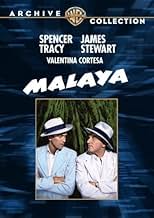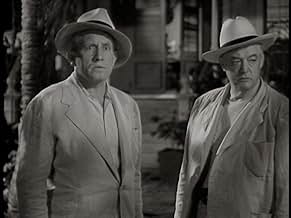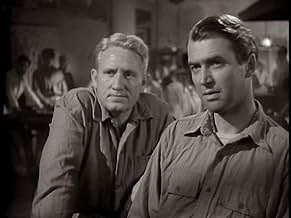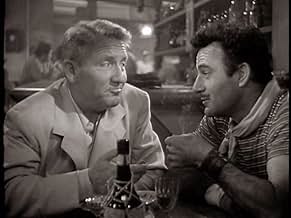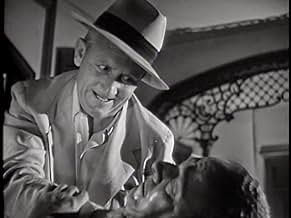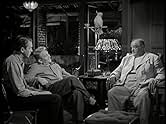IMDb RATING
6.5/10
1.6K
YOUR RATING
Newspaperman Royer convinces government officials of a plan to obtain rubber by smuggling it out from under the Japanese. Carnahan is let out of prison to help.Newspaperman Royer convinces government officials of a plan to obtain rubber by smuggling it out from under the Japanese. Carnahan is let out of prison to help.Newspaperman Royer convinces government officials of a plan to obtain rubber by smuggling it out from under the Japanese. Carnahan is let out of prison to help.
- Director
- Writers
- Stars
- Awards
- 2 wins total
Valentina Cortese
- Luana
- (as Valentina Cortesa)
Lester Matthews
- Matisson
- (scenes deleted)
Joel Allen
- Federal Agent
- (uncredited)
Besmark Auelua
- Henchman
- (uncredited)
George M. Carleton
- Small Businessman
- (uncredited)
Silan Chan
- Malay Girl
- (uncredited)
Spencer Chan
- Chinese Shipmaster
- (uncredited)
Joseph Crehan
- Businessman with Pipe
- (uncredited)
- Director
- Writers
- All cast & crew
- Production, box office & more at IMDbPro
Featured reviews
This film has some really great actors in it - Sydney Greenstreet, Spencer Tracey, Lionel Barrymore, James Stewart, Gilbert Roland, John Hodiak, Richard Loo, etc. And it's got an exotic location (Malaya) and a war-time plot (getting rubber to outfit the US war machine in WW2). But it never manages to get going, maybe because Spencer Tracey was never really an "action" star, or maybe because the director Richard Thorpe, while prolific, wasn't particularly skilled in this genre (he's best known for Ivanhoe, Knights of the Round Table, The Great Caruso, The Student Prince).
It's worth a look, and Barrymore and Greenstreet do their usual wonderful jobs.
It's worth a look, and Barrymore and Greenstreet do their usual wonderful jobs.
Even with a better cast, this would not have been much of a film. On the surface it looks like it will be some sort of action film, with spies going into enemy territory to steal, or rather negotiate on the black market for, essential supplies. But there's little intrigue and very little action. Most of the scenes are simply characters sitting in chairs talking to one another. The surprise at the very end of the film is so far-fetched as to undercut the credibility of nearly everything else. The love story involves two people who have no reason to be attracted to one another. There are elements of Casablanca here, set in a country occupied by the enemy, a nightclub owner consorting with an enemy officer, the gambling being fixed by the owner to pay someone he wants to do a favour to, and a cynic acquiring higher ideals; but it's all a very pale imitation of Casablanca. Some comments suggest that there is something "noirish" about the film. Well. it's in black and white, but it does not have the requisite sense of evil and foreboding.
But the biggest failure is in the casting. James Stewart is supposed to play a sour, hard-bitten, cynical operator who finds a little patriotism late in life. But Stewart can't help coming across as a nice guy. He may speak the tough words, but the tone is wrong. His eyes shift in that self-deprecating way of his, he carries himself in that modest way of his, and he just doesn't come off as the character he is supposed to be playing. When his partner is punching someone over and over in the face, Stewart looks repelled by the brutality. Spencer Tracy is probably even worse in his role as a tough jailbird who is let out of Alcatraz to help in the mission. He looks old; his figure is dumpy, his way of moving is slow. He threatens a man, but he doesn't seem very scary. (DeNiro would know how to do that.) He is the romantic interest of a nightclub singer who is crazy over him, yet he's way too old for her and doesn't have anything of the sort of animal magnetism that might make him believable as her lover. In fact, to be honest, there were moments when Tracy looked like he couldn't act. The Japanese have been beating him, trying to get him to talk; Tracy frowns a little but registers no pain, no discomfort, no fear; he shakes it off and then looks comfortable. When he dumps his girlfriend to keep her safe, his face shows nothing.
I forced myself to watch to the end because I have an interest in Malaya. On its own terms, this movie would have lost me long before the mid-way point.
But the biggest failure is in the casting. James Stewart is supposed to play a sour, hard-bitten, cynical operator who finds a little patriotism late in life. But Stewart can't help coming across as a nice guy. He may speak the tough words, but the tone is wrong. His eyes shift in that self-deprecating way of his, he carries himself in that modest way of his, and he just doesn't come off as the character he is supposed to be playing. When his partner is punching someone over and over in the face, Stewart looks repelled by the brutality. Spencer Tracy is probably even worse in his role as a tough jailbird who is let out of Alcatraz to help in the mission. He looks old; his figure is dumpy, his way of moving is slow. He threatens a man, but he doesn't seem very scary. (DeNiro would know how to do that.) He is the romantic interest of a nightclub singer who is crazy over him, yet he's way too old for her and doesn't have anything of the sort of animal magnetism that might make him believable as her lover. In fact, to be honest, there were moments when Tracy looked like he couldn't act. The Japanese have been beating him, trying to get him to talk; Tracy frowns a little but registers no pain, no discomfort, no fear; he shakes it off and then looks comfortable. When he dumps his girlfriend to keep her safe, his face shows nothing.
I forced myself to watch to the end because I have an interest in Malaya. On its own terms, this movie would have lost me long before the mid-way point.
Malaya (1949)
It would be nice to love this movie—with a strong theme of wartime ingenuity and bravery, and with three stellar actors—but by the end I was thinking everyone involved was just going through the motions. That's probably enough in many ways with people this naturally gifted on screen, and the movie is enjoyable, no question. With all the borrowings or references to earlier classics (Sydney Greenstreet even has a big bird as a pet, as in "Casablanca"), it makes for a fun time.
The premise starts with some very compact storytelling—a somewhat disreputable man (James Stewart) is overheard saying he could smuggle rubber out of British Malaya (now Malaysia). It's WWII and the Army likes the idea enough to send him off with an ex-con (Spencer Tracy) who knows the area well. (This is all arranged with the help of Lionel Barrymore in a small role.)
Then the adventure begins as they penetrate with surprising ease the rubber plantations and arrange with the generally friendly locals and ex-pats to get their hidden stockpiles. The Japanese do eventually catch on and there is fun there, but not before a couple of torch songs and some humorous excess as usual from the likable Greenstreet.
Frankly, things never get exciting or even suspenseful, though interesting all along. One huge problem (for me) was a complete lack of details. The two men would say, okay, let's go get this rubber here, and they meet the plantation owner and there is some talk and then suddenly they are going down the river with some little barges. The Japanese have no suspicions, and the local smugglers are all these cheerful Resistance Fighter types who really like to help a lot.
It would be fun to know if a young viewer finds this exotic and fun or laughable. It's somewhere between in all. And what honestly holds it together for anyone who likes the actors is just watching familiar faces in new roles. That is one of the endless interests of the movies.
See it? Sure, if you already like older films or WWII films. It's not bad. The director Richard Thorpe is quite unknown these days, but the cinematographer is a standard bearer of he period, George Folsey, and that makes every scenes look terrific. Yeah, it's not at all bad. But it ain't great, either.
It would be nice to love this movie—with a strong theme of wartime ingenuity and bravery, and with three stellar actors—but by the end I was thinking everyone involved was just going through the motions. That's probably enough in many ways with people this naturally gifted on screen, and the movie is enjoyable, no question. With all the borrowings or references to earlier classics (Sydney Greenstreet even has a big bird as a pet, as in "Casablanca"), it makes for a fun time.
The premise starts with some very compact storytelling—a somewhat disreputable man (James Stewart) is overheard saying he could smuggle rubber out of British Malaya (now Malaysia). It's WWII and the Army likes the idea enough to send him off with an ex-con (Spencer Tracy) who knows the area well. (This is all arranged with the help of Lionel Barrymore in a small role.)
Then the adventure begins as they penetrate with surprising ease the rubber plantations and arrange with the generally friendly locals and ex-pats to get their hidden stockpiles. The Japanese do eventually catch on and there is fun there, but not before a couple of torch songs and some humorous excess as usual from the likable Greenstreet.
Frankly, things never get exciting or even suspenseful, though interesting all along. One huge problem (for me) was a complete lack of details. The two men would say, okay, let's go get this rubber here, and they meet the plantation owner and there is some talk and then suddenly they are going down the river with some little barges. The Japanese have no suspicions, and the local smugglers are all these cheerful Resistance Fighter types who really like to help a lot.
It would be fun to know if a young viewer finds this exotic and fun or laughable. It's somewhere between in all. And what honestly holds it together for anyone who likes the actors is just watching familiar faces in new roles. That is one of the endless interests of the movies.
See it? Sure, if you already like older films or WWII films. It's not bad. The director Richard Thorpe is quite unknown these days, but the cinematographer is a standard bearer of he period, George Folsey, and that makes every scenes look terrific. Yeah, it's not at all bad. But it ain't great, either.
There is a scene that makes the whole picture worthwhile (although it is otherwise pretty ordinary):
Sydney GREENSTREET is entering a room after app. 2/3 of the movie, where Spencery Tracey has just been "treated kindly" in an "interview", Greenstreet is sweating (as always), sitting down and looking at the molestor of Tracy, then says (roughly): "If you say this was necessary, then of course it was necessary, but wasn't that much for a bottle of poor booze?". The officer say: "But he broke our rules". Greenstreet: "A man who drinks and then doesn't break any rules is no man. Drinking and making troubles goes together, this is also a rule." What a line !! Officer: "I love your logic." Of course these are not exactly the lines from the picture, cause I saw the German dubbed version and re-translated them, but they can only be better in the English version.
Hilarious! Tape it, when shown on TV next time and get to that scene, it is just great!
Sydney GREENSTREET is entering a room after app. 2/3 of the movie, where Spencery Tracey has just been "treated kindly" in an "interview", Greenstreet is sweating (as always), sitting down and looking at the molestor of Tracy, then says (roughly): "If you say this was necessary, then of course it was necessary, but wasn't that much for a bottle of poor booze?". The officer say: "But he broke our rules". Greenstreet: "A man who drinks and then doesn't break any rules is no man. Drinking and making troubles goes together, this is also a rule." What a line !! Officer: "I love your logic." Of course these are not exactly the lines from the picture, cause I saw the German dubbed version and re-translated them, but they can only be better in the English version.
Hilarious! Tape it, when shown on TV next time and get to that scene, it is just great!
Just by chance I was home to catch this terrific movie when it was shown a few days ago on cable TV...what a happy surprise! Both Stewart and Tracy play "good-bad guys" whose inner morality and patriotism rises to the top when the going gets tough. The supporting cast is full of top talent, including super performances from John Hodiak, Sidney Greenstreet, and Lionel Barrymore. Richard Loo and Gilbert Roland both play brilliantly to their "type" and are fine as well, and Roland Winters (usually in pompous comic roles) is very effective as a German rubber plantation owner who should not be trusted! Look for the always-welcome Russel Hicks in the scene on the train, and savor the sound of his elegant voice.
In addition, the script by Frank Fenton is way above average, with very droll and off-hand wit in evidence throughout.
All in all, a first-rate movie which deserves to be much better known!
In addition, the script by Frank Fenton is way above average, with very droll and off-hand wit in evidence throughout.
All in all, a first-rate movie which deserves to be much better known!
Did you know
- TriviaSydney Greenstreet's final film.
- GoofsOne scene features wild chimpanzees. Chimps are natives of Africa, not Malaya.
- Quotes
John Royer: You have to remember, this guy's a German.
Carnaghan: Yeah, but he's a greedy man, and greed has a nationality all its own.
- ConnectionsEdited from Les sacrifiés (1945)
- SoundtracksBlue Moon
(uncredited)
Written by Richard Rodgers and Lorenz Hart
Performed by Valentina Cortese (as 'Luana'), also whistled by James Stewart
- How long is Malaya?Powered by Alexa
Details
Box office
- Budget
- $2,396,000 (estimated)
- Runtime
- 1h 38m(98 min)
- Color
- Aspect ratio
- 1.37 : 1
Contribute to this page
Suggest an edit or add missing content

